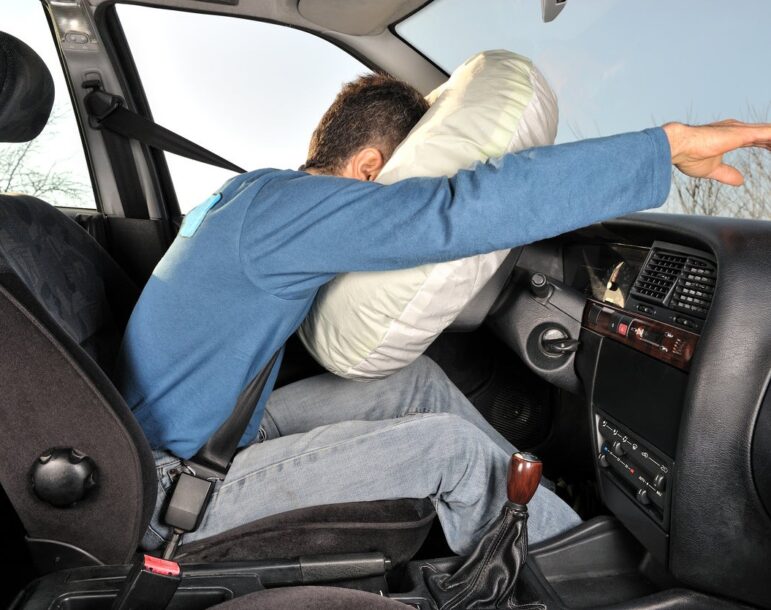Airbags are an important safety feature in modern vehicles. They can help reduce injuries and fatalities sustained in car accidents. The National Highway Traffic Safety Administration (NHTSA) estimates that from 1987 to 2017, airbags directly saved more than 50,000 lives.
Faulty airbags
However, like many parts in your vehicle, they can be defective. There is a possibility that when you are involved in a car accident, your airbags may not deploy. The following are the most common reasons why car airbags may not deploy in an accident.
1. Airbags are designed to deploy under the right circumstances. – If your airbags did not deploy when you were involved in an accident, it most likely was not the correct “type” of accident. For example, in side-impact or rear-impact crashes, the front airbags are unlikely to deploy. This is because the airbag sensors are calibrated to activate when the front bumper or front corners of your vehicle are struck.
2. Ineffective sensors – If you are sure that the type of collision you were involved in was enough to cause your airbag to deploy, but it did not, the airbag sensors may be faulty. This may be due to manufacturer deficiencies or glitches in the software that controls them.
3. Defective electrical components – Faulty wiring can cause the airbags to not deploy in situations where they should. These components are designed to activate the airbags by communicating with the sensors and the airbag units themselves. One sign that your vehicle has faulty electrical components is when one of your airbags deploys during an accident, but others don’t.
4. Damaged or frayed wiring – Airbags often do not deploy if the wiring runs through areas that could be damaged in a crash. If a car is in a minor accident and has been repaired, there is a chance that the mechanics working on your vehicle may have damaged the wiring without noticing. This damage can prevent signals from reaching the airbag module, the device responsible for deploying the airbags.
5. Defective airbag modules – The airbag module is the component responsible for the timely delivery of the airbag. Lack of implementation can be a sign of a faulty module which may be due to a poor manufacturing process or poor quality control.
Common defects by which the airbags did not deploy in an accident
In addition to the issues described above, there are other common defects with airbags that can cause problems with airbag deployment.
1. Clock spring – A bad clock spring in the steering wheel can cause the airbag to malfunction when you need it most. Damage to the clock spring can cause you to lose a connection between the airbag control module and the steering wheel airbag.
2. Electronic control unit – Problems with a vehicle’s electronic control unit, or ECU, can cause the airbags to not deploy. If an error in the ECU has recorded false crash data, it may not attempt to deploy the airbags again because it believes that the airbags have already been used.
Other problems
Some airbags may inflate too quickly, and they may or may not explode as quickly as required to keep passengers safe from harm. However, this problem is quite rare in modern cars.
What to do if your airbags are defective?
Because they are an important safety feature, if you think you have a problem with your car’s airbags, you should take them to an authorized repair shop as soon as possible. By having a mechanic check your vehicle you can ensure your car’s airbags can protect you in case of an accident.
The recent recall of 34 million cars for defective airbags
In what was known as the largest recall in US history, the National Highway Traffic Safety Administration (NHTSA) and Takata made a historic recall for 34 million cars in 2017, which were equipped with defective airbags.
The problem with the airbags centered on the Takata-made inflation system, which could explode violently when activated, scattering metal fragments into the cabin. As of June 2022, this manufacturing defect has claimed the lives of 24 people and injured more than 400, according to the NHTSA.
The problem is that the mechanism that inflates the airbag degrades in high humidity conditions and over time. These devices carry small explosive charges, which cause the airbag to inflate. However, in the case of defective mechanisms, the explosion is much more violent and can cause pieces of the airbag support and its internal structure to be projected in the form of shrapnel toward the occupants of the vehicle.
The problem with Takata’s airbags dates to the year 2000 when some consumers began reporting defects in the airbags. In November 2008, Honda recalled more than 4,000 cars due to the same problem, and six months later, after a young man died due to injuries caused by flying metal fragments after the airbag activated, the Japanese automaker made a recall for 510 thousand more vehicles.
The Honda recall was the trigger that opened an investigation in 2009, which lasted just six months. However, a short time later, more recalls were issued for cars equipped with Takata airbags, prompting a second investigation by NHTSA.
Since 2014, tens of millions of vehicles containing approximately 67 million Takata airbags have been recalled in the United States over defective inflators that may cause the airbags to overinflate and explode.
Being one of the largest and most important suppliers worldwide, Takata was obliged to replace the affected airbags at no cost for the cars of the brands it supplies: BMW, Fiat-Chrysler, Ford, General Motors, Honda, Mazda, Mitsubishi, Nissan, Subaru, and Toyota.
But the problem didn’t stop there, years after millions of Takata airbags were recalled, the NHTSA has reported at least four new deaths in 2022, which resulted from faulty inflators causing airbag explosions.
Lawsuits for defective airbags in an accident
If you were involved in a car accident in which a defective airbag aggravated your injuries, you may be eligible to file a product liability lawsuit. Our experienced attorneys can provide you with a free consultation that can help you better understand your situation. Our attorneys have helped thousands of injured drivers and their passengers, so don’t delay, contact us today online or by phone at 832-844-6428.
Contact a Local Lawyer
Get in touch with us so we can evaluate your case for free. Call PMR Law at 832-844-6428 and a member of our team will get in touch with you immediately.
PMR Law is considered one of the Best Law Firms in America, by Rue Ratings. Several of our attorneys have been given the honor of being named Super Lawyers by Thomson Reuters. The American Institute of Personal Injury Attorneys has named our attorneys 10 Best in Client Satisfaction. Speaking of personal injury, Attorney and Practice Magazine awarded our attorneys with Top 10 Personal Injury Attorney distinctions. The National Trial Lawyers have named three of our attorneys as Top 100 attorneys. The Academy of Attorneys has named two of our attorneys as Top 40 Under 40. Our attorneys have been recognized as Best Attorneys of America, by Rue Ratings. PMR Law is a proud member of the Multi-Million Dollar Advocate Forum. Houstonia Magazine has named two of our attorneys as Top Lawyers in Personal Injury. Texas Lawyer magazine has named PMR Law as the #1 Personal Injury Law Firm in Houston.

